Culture1Schoollife教学设计书.doc
- 格式:doc
- 大小:587.96 KB
- 文档页数:8
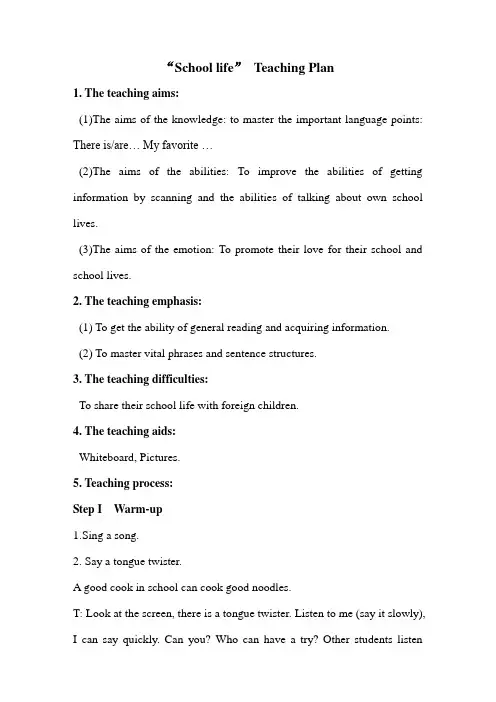
“School life”Teaching Plan1. The teaching aims:(1)The aims of the knowledge: to master the important language points: There is/are… My favorite …(2)The aims of the abilities: To improve the abilities of getting information by scanning and the abilities of talking about own school lives.(3)The aims of the emotion: To promote their love for their school and school lives.2. The teaching emphasis:(1) To get the ability of general reading and acquiring information.(2) To master vital phrases and sentence structures.3. The teaching difficulties:To share their school life with foreign children.4. The teaching aids:Whiteboard, Pictures.5. Teaching process:Step I Warm-up1.Sing a song.2. Say a tongue twister.A good cook in school can cook good noodles.T: Look at the screen, there is a tongue twister. Listen to me (say it slowly), I can say quickly. Can you? Who can have a try? Other students listencarefully, then tell me who is the best one. Let’s say it together. I think everybody is the best one in class. Boys and girls, Are you the best one? 3. Free talkT: You are so lovely, I love you. And I love your school, too. Because there are so many high buildings, friendly teachers and lovely kids. Do you love your school? Why? Is your school the best one in Yichang? Step II Pre-reading1. Show a picture of Tina.T: I have a foreign friend, her name is Tina. She said her school is the best one in the world. Do you have any questions?Ss: What’s in her school?When/how does she go to school?What class does she have?What does she do after class?What’s her favorite lesson/teacher/?…(Let the Ss imagine the answers.)T: Good questions. Look, Tina wrote us a letter to introduce her school life. Would you like to have a look?Step III While-Reading1. Let the Ss watch and listen the letter, then think about 2 questions.1). Where is Tina from?2). Does Tina have fun in school?(Watch and listen the letter, then think about 2 questions. )2. Read the paragraph 1, and think. (T: What’s in her school? What is it like? Take out your letter, read the paragraph 1, circle the answers)1).What can you see in Tina’s school?2).What’s her school like?3. Read paragraph2 then tick or cross: (What class does she have? Let’s read paragraph 2, and then tick or cross.)1) Tina often goes to school on foot. ( )2) Classes begin at 8:00. ( )3) Tina has Chinese class in school. ( )4) Tina has lunch at home. ( )5) Tina joins a music club after school. ( )(T: Read it again and find out the difficult words or sentences. Teach the new words: history, social practice, club… )3. Read the paragraph 3 and 4, try to ask more questions then ask and answer in groups.(T: this group read the paragraph 3, and this group read the paragraph 4, Try to ask more questions.)4. Try to retell the letter (Key words).(T: We know something about Tina’s school life. Her school is….how do you think Tina’s school life? It’s …)Step IV Past-readingLet Ss say something about their school lives in groups of four. Each of them needs to choose a main idea to talk about.1. school and your classroom2. lessons and activities3. your teachers4. your classmates, friends(T: Boys and girls, Tina really wants to know your school life in China, can you introduce for her? You can choose a main idea to talk about.) Step V. Extension1. Ss write down the main idea in groups. ( T: Take out your letter, write to Tina, please.)2. Give a report then make a letter to Tina.(T: Which group can read your letter? Stick your letter on the blackboard. Boys and girls , This is a letter from … to Tina , so we should write …here.)3. T: Your school life is so wonderful and colorful. We wish our school will shine everyday. We wish our school life is more and more colorful and wonderful. Let’s sing the song “our school”.Step VI : Homework Collect the school life of foreign pupils, and tell your classmates.Writing on the blackboardSchool lifeWhat’s…like? b uilding The USA ChinaWhat class… have ? e ducationHow many…? s tudentWhat’s her favorite…? t eacher。
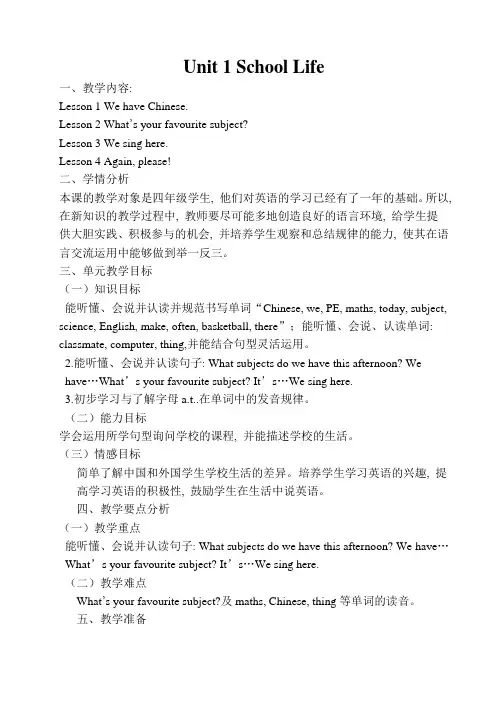
Unit 1 School Life一、教学内容:Lesson 1 We have Chinese.Lesson 2 What’s your favourite subject?Lesson 3 We sing here.Lesson 4 Again, please!二、学情分析本课的教学对象是四年级学生, 他们对英语的学习已经有了一年的基础。
所以, 在新知识的教学过程中, 教师要尽可能多地创造良好的语言环境, 给学生提供大胆实践、积极参与的机会, 并培养学生观察和总结规律的能力, 使其在语言交流运用中能够做到举一反三。
三、单元教学目标(一)知识目标能听懂、会说并认读并规范书写单词“Chinese, we, PE, maths, today, subject, science, English, make, often, basketball, there”;能听懂、会说、认读单词: classmate, computer, thing,并能结合句型灵活运用。
2.能听懂、会说并认读句子: What subjects do we have this afternoon? We have…What’s your favourite subject? It’s…We sing here.3.初步学习与了解字母a.t..在单词中的发音规律。
(二)能力目标学会运用所学句型询问学校的课程, 并能描述学校的生活。
(三)情感目标简单了解中国和外国学生学校生活的差异。
培养学生学习英语的兴趣, 提高学习英语的积极性, 鼓励学生在生活中说英语。
四、教学要点分析(一)教学重点能听懂、会说并认读句子: What subjects do we have this afternoon? We have…What’s your favourite subject? It’s…We sing here.(二)教学难点What’s your favourite subject?及maths, Chinese, thing等单词的读音。
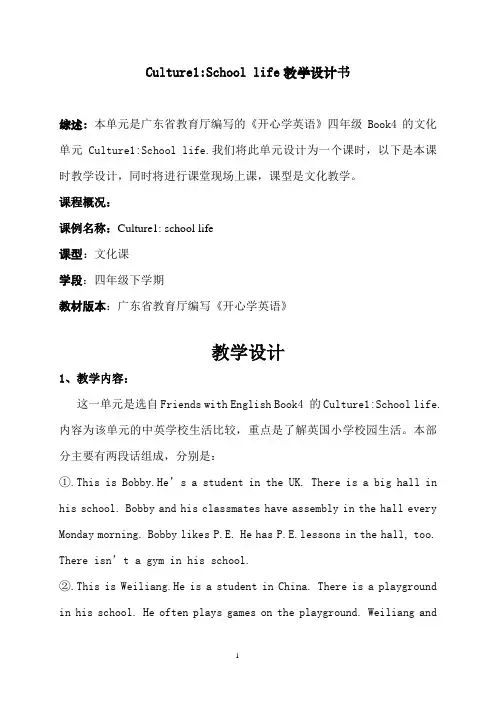
Culture1:School life教学设计书综述:本单元是广东省教育厅编写的《开心学英语》四年级Book4的文化单元 Culture1:School life.我们将此单元设计为一个课时,以下是本课时教学设计,同时将进行课堂现场上课,课型是文化教学。
课程概况:课例名称:Culture1: school life课型:文化课学段:四年级下学期教材版本:广东省教育厅编写《开心学英语》教学设计1、教学内容:这一单元是选自Friends with English Book4 的Culture1:School life.内容为该单元的中英学校生活比较,重点是了解英国小学校园生活。
本部分主要有两段话组成,分别是:①.This is Bobby.He’s a student in the UK. There is a big hall in his school. Bobby and his classmates have assembly in the hall every Monday morning. Bobby likes P.E. He has P.E.lessons in the hall, too. There isn’t a gym in his school.②.This is Weiliang.He is a student in China. There is a playground in his school. He often plays games on the playground. Weiliang andhis classmates have flag-raising ceremony on the playground every Monday morning. They do morning exercise there at 10 a.m.from Monday to Friday.本课时灵活运用以上材料,根据本校自身特点,把Weiliang换成是孩子们熟悉的同班同学李泳航,由他来介绍我们的中国式校园生活。
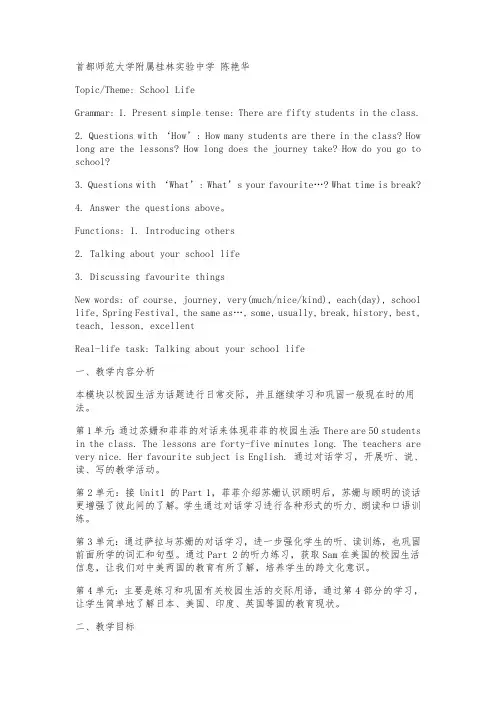
首都师范大学附属桂林实验中学陈艳华Topic/Theme: School LifeGrammar: 1. Present simple tense: There are fifty students in the class.2. Questions with ‘How’: How many students are there in the class? How long are the lessons? How long does the journey take? How do you go to school?3. Questions with ‘What’: What’s your favourite…? What time is break?4. Answer the questions above。
Functions: 1. Introducing others2. Talking about your school life3. Discussing favourite thingsNew words: of course, journey, very(much/nice/kind), each(day), school life, Spring Festival, the same as…, some, usually, break, history, best, teach, lesson, excellentReal-life task: Talking about your school life一、教学内容分析本模块以校园生活为话题进行日常交际,并且继续学习和巩固一般现在时的用法。
第1单元:通过苏姗和菲菲的对话来体现菲菲的校园生活:There are 50 students in the class. The lessons are forty-five minutes long. The teachers are very nice. Her favourite subject is English. 通过对话学习,开展听、说、读、写的教学活动。
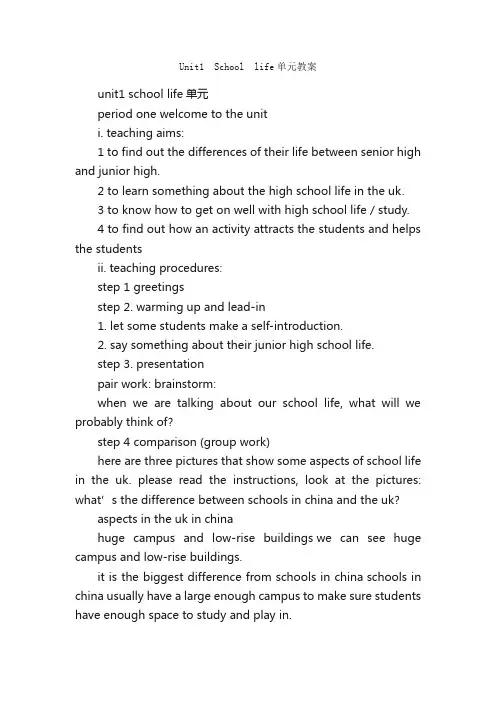
Unit1 School life单元教案unit1 school life单元period one welcome to the uniti. teaching aims:1 to find out the differences of their life between senior high and junior high.2 to learn something about the high school life in the uk.3 to know how to get on well with high school life / study.4 to find out how an activity attracts the students and helps the studentsii. teaching procedures:step 1 greetingsstep 2. warming up and lead-in1. let some students make a self-introduction.2. say something about their junior high school life.step 3. presentationpair work: brainstorm:when we are talking about our school life, what will we probably think of?step 4 comparison (group work)here are three pictures that show some aspects of school life in the uk. please read the instructions, look at the pictures: what’s the difference between schools in china and the uk?aspects in the uk in chinahuge campus and low-rise buildings we can see huge campus and low-rise buildings.it is the biggest difference from schools in china schools in china usually have a large enough campus to make sure students have enough space to study and play in.but most school buildings are taller, at least three storeys.lockers for every student there are rows of lockers by the classrooms for students to put their stationary, books, exercise-books and other belongings. students bring what they need for lessons to school and then take it all back home after school. most schools in china do not have equipment in the classroom.fewer students in each class there are fewer students in a class, no more than 30 per class. there are usually more students in high school, perhaps 40 to 50 per class. recently some school are beginning to limit the number of students in each class.at ease with our teacher students have a close relationship with their teachers. they feel at ease and comfortable with them. it is similar in china. nowadays, lots of teachers and students have established a good relationship with each other. they respect each other and work to gain a better understanding of each other.step 5 discussionl what kind of school activities do you enjoy?2 do you know any further differences between the schools in the uk and china?3 what is your dream school life like?what do you think the teachers should be like?。
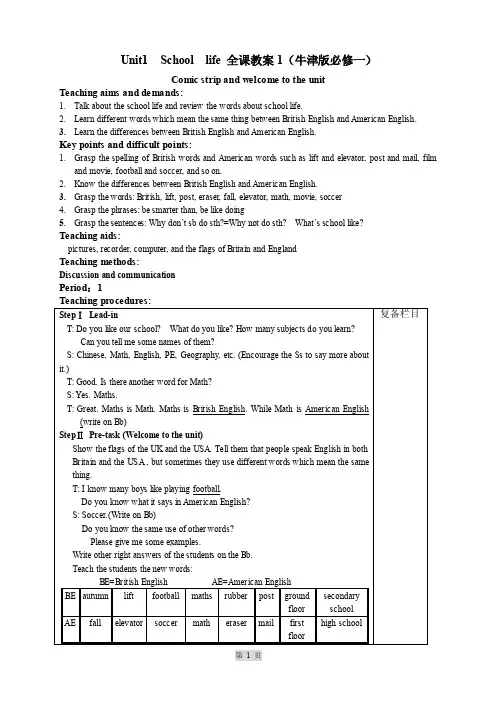
Unit1 School life 全课教案1(牛津版必修一)Comic strip and welcome to the unitTeaching aims and demands:1.Talk about the school life and review the words about school life.2.Learn different words which mean the same thing between British English and American English.3.Learn the differences between British English and American English.Key points and difficult points:1.Grasp the spelling of British words and American words such as lift and elevator, post and mail, filmand movie, football and soccer, and so on.2.Know the differences between British English and American English.3.Grasp the words: British, lift, post, eraser, fall, elevator, math, movie, soccer4.Grasp the phrases: be smarter than, be like doing5.Grasp the sentences: Why don‟t sb do sth?=Why not do sth? What‟s school like?Teaching aids:pictures, recorder, computer, and the flags of Britain and EnglandTeaching methods:Discussion and communicationPeriod:1Reading(1)Teaching aims and demands:1.Know the school lives in British school and American school.2.Learn to read and understand the article with different ways of reading.3.Learn how to understand the writer‟s opinion.Key points and difficult points:1. Know the meanings of the new words: mixed, together, subject, myself, tasty, meal, guy(s), twice, softball, practice, buddy, senior, hero, close, article, admire2. Understand the meanings of the phrases: in Y ear 8=in Grade 8,a mixed school, Home Economics, learn how to do sth, do sth for oneself, cook healthy and tasty meals, bring in, a Reading Week, the end of sth, as well, take a bus, twice a week, spend time doing sth, learn about, help sb with sth, each other, have a great time doing sth.3. Can use this sentence: What does the word …hero‟ mean?It means someone you admire very much.Catch the main information about Lives in a British school and an American schoolTeaching aids: Recorder and computerTeaching methods: Asking and answering questions, communication and discussion Period:2Reading 2Teaching aims and demands:1.Can grasp the words, phrases and language points of the two articles.2. Can retell the lives in a British school and an American school.Key points and difficult points:1. Some important language points.2. Retell the two articles completely.Teaching aids: Recorder, a small blackboardTeaching methods: Explanation and exercisePeriod:3Period:9-4Teaching aims and demands:1.Learn about the school subjects.2.Review and learn the adjective nouns about people‟s opinion.3.Grasp the opposites of the adjective nouns.Key points and difficult points:1. Grasp the new words such as art, geography, language, PE, science, useful, unimportant, useless,unpopular and so on.2. Can give opinion on different school subjects.Teaching aids: Computer and the timetableTeaching methods: Summarize and explanationPeriod:9-4Grammar A&BTeaching aims and demands:pare two things using …more…than‟, …fewer…than‟ and …less…than‟.2. Compare more than two things using …the most‟ for the largest amount and …the fewest‟/ …theleast‟ for the smallest amount.Key points and difficult points:1.How to use …more…than‟, …fewer…than‟ and …less…than‟.2.How to use …the most‟ …the fewest‟ and …the least‟. Teaching aids:Teaching methods: pictures, objects and computer Period:5Grammar C& CheckoutTeaching aims and demands:1.Can make comparisons using …the same as‟ and …different from‟.2.Can make comparisons using …the same…as‟.Key points and difficult points:Grasp the sentences like these: My uniform is the same as Simon‟s uniform.My uniform is different from John‟s uniform.Millie‟s pencil box is the same size as Amy‟s pencil box. Teaching aids: Objects and picturesTeaching methods: Exercise and explanationPeriod:6Teaching procedures:Integrated skills (A)Teaching aims and demands:1.Listen to the conversation and try to collect the information.2.Learn more differences of the school lives between China and foreign countries.3.Review the Grammar we have learned.Key points and difficult points:1.How to collect the information you need from the conversation.2.Grasp the Grammar masterly.Teaching aids: RecorderTeaching methods:Asking and answering questions, discussion, practice Period:7Teaching procedures:Speak up & PronunciationTeaching aims and demands:1.Can talk about different schools.2.Can read the dialogue and the sentences in right intonations.3.Know that we make our voice fall at the end of an affirmative sentence. Know that we make our voice rise at the end of a sentence to show surprise. Key points and difficult points:1.Talk about different schools.2.Showing surprise.Teaching aids: RecorderTeaching methods: Reading and practicingPeriod:8Teaching procedures:Main task Period:9-9Teaching aims and demands:1.Learn how to finish the questionnaire with personal information.2.Learn to make a timetable according to the questionnaire.3.Learn to write …My ideal school‟.Key points and difficult points:1.How to know about what people like and dislike.2.How to write …My ideal school‟.Teaching aids:Recorder and computerTeaching methods:Answering the questions of students‟, explanation and exercise。
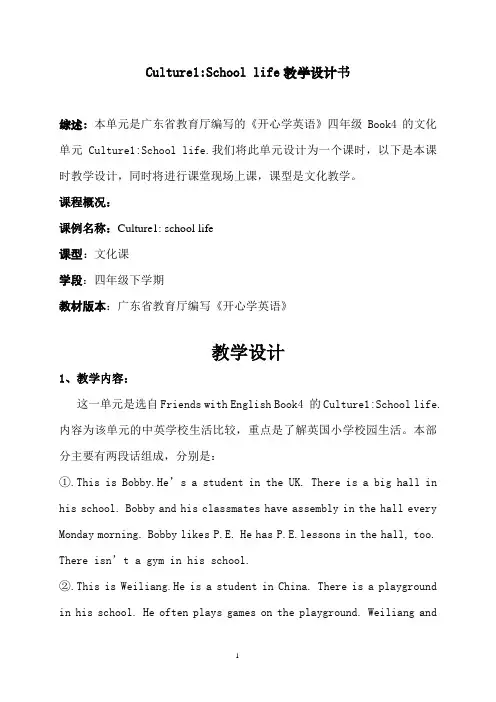
Culture1:School life教学设计书综述:本单元是广东省教育厅编写的《开心学英语》四年级Book4的文化单元 Culture1:School life.我们将此单元设计为一个课时,以下是本课时教学设计,同时将进行课堂现场上课,课型是文化教学。
课程概况:课例名称:Culture1: school life课型:文化课学段:四年级下学期教材版本:广东省教育厅编写《开心学英语》教学设计1、教学内容:这一单元是选自Friends with English Book4 的Culture1:School life.内容为该单元的中英学校生活比较,重点是了解英国小学校园生活。
本部分主要有两段话组成,分别是:①.This is Bobby.He’s a student in the UK. There is a big hall in his school. Bobby and his classmates have assembly in the hall every Monday morning. Bobby likes P.E. He has P.E.lessons in the hall, too. There isn’t a gym in his school.②.This is Weiliang.He is a student in China. There is a playground in his school. He often plays games on the playground. Weiliang andhis classmates have flag-raising ceremony on the playground every Monday morning. They do morning exercise there at 10 a.m.from Monday to Friday.本课时灵活运用以上材料,根据本校自身特点,把Weiliang换成是孩子们熟悉的同班同学李泳航,由他来介绍我们的中国式校园生活。
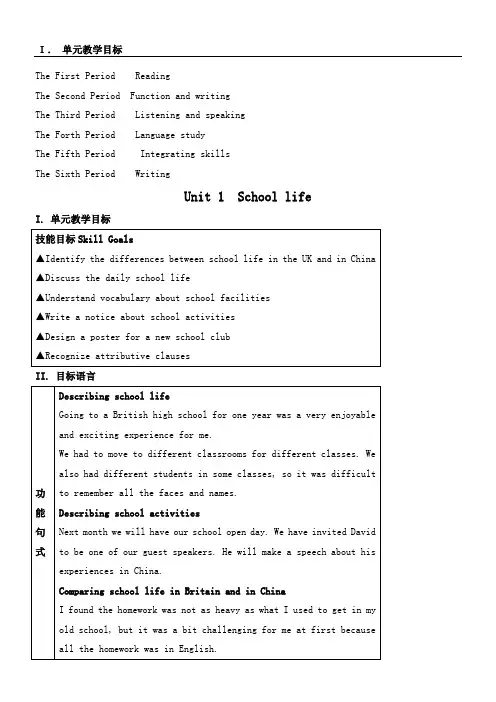
I.单元教学目标The First Period ReadingThe Second Period Function and writingThe Third Period Listening and speakingThe Forth Period Language studyThe Fifth Period Integrating skillsThe Sixth Period WritingUnit 1 School life I. 单元教学目标II. 目标语言Ⅲ. 教材分析与教材重组1. 教材分析本单元以School life为话题,旨在通过单元教学使学生了解英国校园生活的一些基本情况及中英两国校园生活的不同之处;学习并能运用表示校园设施的一些基本词汇;学习定语从句的基本概念及关系代词的用法;能就校园活动的话题展开讨论;能就校园活动情况向班任老师做出报告;学习通知的写法;学会设计以介绍学校俱乐部为主题的海报等。
Welcome to the unit 部分利用四幅图片,分别从(校园风貌、生活设施、课堂教学、师生关系)四个不同的侧面介绍了英国校园生活的有关情况。
该部分还设计了三个讨论话题,引导学生对中英两国校园生活进行比较,并就相关话题发表自己的看法。
Reading部分的短文节选自一份校园杂志。
文章由一位交换留学生所写。
作者通过自己的亲身经历简要地介绍了英国学校生活的一些情况。
文章前后分别设计了五个部分的练习:前两个练习(A、B)要求学生运用本单元介绍的两种基本阅读方法(skimming and scanning)阅读文章,把握文章主旨大意,了解文中明显的细节内容;练习C1通过问题的形式考查学生对文中具体信息的把握程度;C2通过判断正误练习加深学生对阅读材料的理解;D部分为词汇练习,要求学生首先联系上下文猜测所给词汇的含义;然后通过配对练习帮助学生掌握新词的含义和用法;E部分要求学生通过运用所给词汇填空的方式完成一封英国学生写给Wei Hua的信件,以进一步加深学生对阅读内容的理解;练习F设计了两个话题,引导学生对校园生活有关话题展开讨论,以获得对文章深层次的理解。
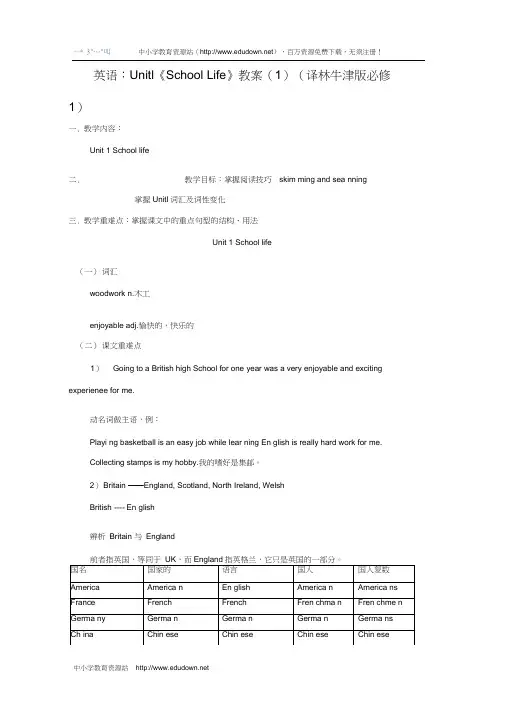
英语:Unitl《School Life》教案(1)(译林牛津版必修1)一.教学内容:Unit 1 School life二.教学目标:掌握阅读技巧skim ming and sea nning掌握Unitl词汇及词性变化三.教学重难点:掌握课文中的重点句型的结构、用法Unit 1 School life(一)词汇woodwork n.木工enjoyable adj.愉快的,快乐的(二)课文重难点1)Going to a British high School for one year was a very enjoyable and exciting experienee for me.动名词做主语,例:Playi ng basketball is an easy job while lear ning En glish is really hard work for me.Collecting stamps is my hobby.我的嗜好是集邮。
2)Britain ——England, Scotland, North Ireland, WelshBritish ---- En glish辨析Britain 与England前者指英国,等同于UK,而England指英格兰,它只是英国的一部分。
(1)n.经验,u.n.He is a teacher full of experie nee.(2)n.经历 c.n.We would like to sit around Marco Polo and listen to his exciting experienees in China. Yao Ming ' s experienee in American will make him become a better player.姚明在美国的经历将使他成为更加优秀的球员。
(3)v.体验to experie nee this differe nt way of lifeto experie nee the beauty of n ature体验自然之美联想1: experieneed adj.an experie need teacher联想2:experiment n.实验【模拟试题】(答题时间:45分钟)一、单项填空1. —Do you mind my here?—No, _____ .A. smoke, a bitB. smoked, a littleC. smok ing, not a bitD. smok ing, not a little2. —How long each other before they ______ married?—For about a year.A. have they known, get.B. had they known, gotC. had they see n, gotD. did they know, get3. If you don ' t go swimming, .A. nor shall IB. so will IC. neither do ID. so do I4. You ' d better leave the windows _____ and the door ________A. ope n, closedB. ope ned, clos ingC. ope ned, closeD. ope n, close5. She looked unhappy because she had made _______ mistakes in the English test.6. The sports meet was put off _______ the rain.7. He likes to eat sugar, but _____ in my opinion. A. too muchB. much tooC. too many8. I wonder ________ the foods he ate were high _______ fat and sugar. A. that, ofB. if, inC. what, forD. but, from9. My family _________ TV when my classmates _______ to see me. A. watched, was coming B. was watch ing, coming C. will watch, comeD. were watch ing, came10. I ' m hunting for a housdc®, bright, comfortable and ________ with a big garden. A. all over B. after allC. above allD. in all、阅读理解A. exceptB. becauseC. whenD. because ofA. two scoresB. scores ofC. two scores ofD. score ofD. many too氐*■dSZhil ♦ IldL 中小学教育资源站(),百万资源免费下载,无须注册!11. If you are in terested in work ing in a hotel, call _____ .A. 435-9201B. 534-7618C. 324-9817D. 357-289712. If you want to get a job as a maths teacher, send you resume to ______A. 237 Rockledge St., Syracuse, NY. 13224.B. 404 Snow Road, Syracuse, NY. 13224C. 500 Park Drive, DeWitt, NY . 13214D. 19 South 8 th ST. NY. 1321413. If you dislike work ing on Sun days, being a ____ should be your best choice.A. cookB. secretaryC. salespers onD. veteri naria n assista nt14. If you want to get a job at _______ , you must have office skills.A. Martin ' s ApparelB. East Side Man ageme ntC. Wales Charter SchoolD. Joh nson Marks Ani mal Hospital【试题答案】一、1-5 CBAAB 6-10 DABDC二、11-14 DDCB。
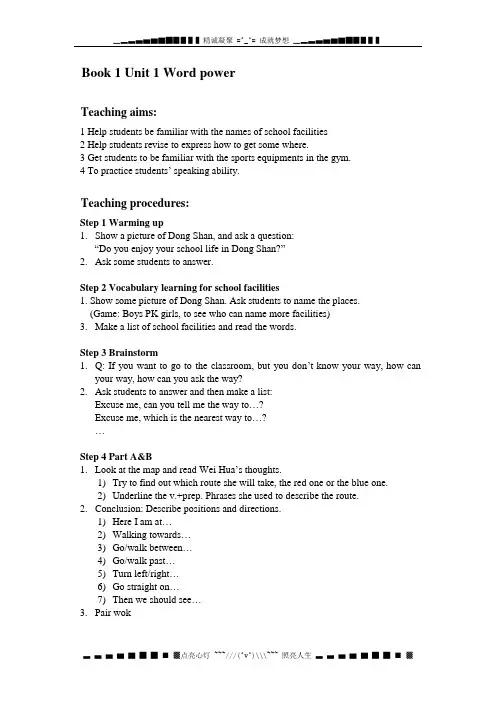
Book 1 Unit 1 Word powerTeaching aims:1 Help students be familiar with the names of school facilities2 Help students revise to express how to get some where.3 Get students to be familiar with the sports equipments in the gym.4 To practice students’ speaking ability.Teaching procedures:Step 1 Warming up1.Show a picture of Dong Shan, and ask a question:“Do you enjoy your school life in Dong Shan?”2.Ask some students to answer.Step 2 Vocabulary learning for school facilities1. Show some picture of Dong Shan. Ask students to name the places.(Game: Boys PK girls, to see who can name more facilities)3.Make a list of school facilities and read the words.Step 3 Brainstorm1.Q: If you want to go to the classroom, but you don’t know your way, how canyour way, how can you ask the way?2.Ask students to answer and then make a list:Excuse me, can you tell me the way to…?Excuse me, which is the nearest way to…?…Step 4 Part A&B1.Look at the map and read Wei Hua’s thoughts.1)Try to find out which route she will take, the red one or the blue one.2)Underline the v.+prep. Phrases she used to describe the route.2.Conclusion: Describe positions and directions.1)Here I am at…2)Walking towards…3)Go/walk between…4)Go/walk past…5)Turn left/right…6)Go straight on…7)Then we should see…3.Pair wokAsk students to read the guidelines of Part B, and finish the writing description of the quickest way to get from the dormitories to Classroom 4. Then get each of them to read their passage to their partner. And then ask some of them to read their passage to the whole class.Sample answers:(B) If you are standing at the door of the dormitories, first turn right and go past the medical centre and the gym, then turn left and walk until the end of the road. Classroom is on your left.4. Design some more samples for the students to practice. For example, ask students to mark the shortest way from the science laboratory to classrooms 16-25. This exercise encourages students to familiarize the phrases of finding the way. (If time doesn’t permit, this step can be left out.)5. Ask students to finish Part C individually, and then check the answers with the whole class.Answers:(C) 1 car park 2 classrooms 3 library 4 labs 5 gym 6 swimming pool 7 dormitories 8 medical centre 9 canteenStep 5 Vocabulary extension1. Lead in.Q: For all the school facilities, which one do you like best?Ss: …T: I liked to go the gym most, when I was in my university, I can do sports there and keep fit. There are many kinds of sports equipments in the gym.2. Show a picture of the gym.3. Ask students to read the guidelines of Part D. Then get them to look at the words under the picture and guess the meaning of each word. They can first write down the number of the words of which they know the meanings before these words. Then guide students to guess the meanings of the words they don’t know.Answers:(D) 4 beam 7 barbell 1 climbing bars 6 basketball court 2 rings 8 mat 3 dumb-bell 5 skipping rope2 Ask students to read the words that appear in this part and try to learn them by heart. Step 6 Discussion1.If we will build a new big gym in Dong Shan, what kinds of equipments or courtsshould be included in your opinion?2.Ask students to discussion the above topic in groups, and then ask some of themto show their results.Step 7 Homework1. Let the students to remember all the useful words and expressions in Part A, B, andD .2. Ask the students to make a map of Dong Shan Senior High School.。
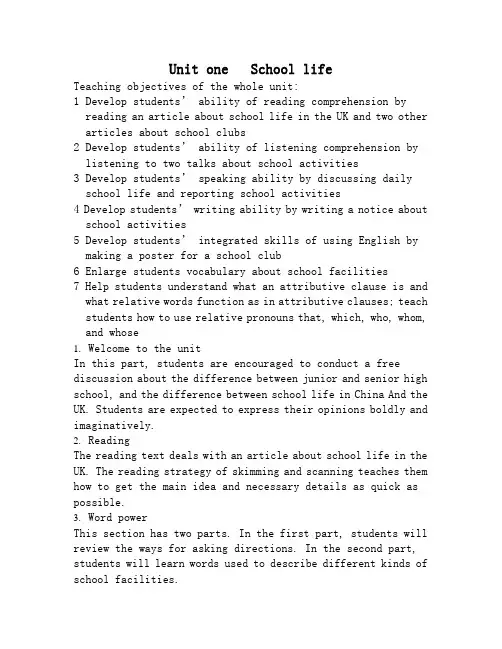
Unit one School lifeTeaching objectives of the whole unit:1 Develop students’ ability of reading comprehension by reading an article about school life in the UK and two other articles about school clubs2 Develop students’ ability of listening comprehension by listening to two talks about school activities3 Develop students’ speaking ability by discussing daily school life and reporting school activities4 Develop students’writing ability by writing a notice about school activities5 Develop students’ integrated skills of using English by making a poster for a school club6 Enlarge students vocabulary about school facilities7 Help students understand what an attributive clause is and what relative words function as in attributive clauses; teach students how to use relative pronouns that, which, who, whom, and whose1.Welcome to the unitIn this part, students are encouraged to conduct a free discussion about the difference between junior and senior high school, and the difference between school life in China And the UK. Students are expected to express their opinions boldly and imaginatively.2.ReadingThe reading text deals with an article about school life in the UK. The reading strategy of skimming and scanning teaches them how to get the main idea and necessary details as quick as possible.3.Word powerThis section has two parts. In the first part, students will review the ways for asking directions. In the second part, students will learn words used to describe different kinds of school facilities.4.Grammar and usageThe grammar focus in this unit is on attributive clause. Students are expected to learn what attributive clauses are and understand how to use the relatives5.TaskThis section consists of a series of activities which will provide students with opportunities to practice the language skills. And through the three steps, students will learn how to use abbreviation to take notes and write a notice.6.ProjectThe project in this unit is designed to help students learn and use English through making a club poster. The purpose of this section is to help students use what they have learnt to finisha project by working together.7.Self-assessmentThis section aims to help students determine the progress they have made.Period arrangement:Welcome to the unit: 1 periodReading: 3 periodsWord power: 1 periodGrammar and usage: 2 periodsTask: 2 periodsProject: 2 periodsRevision and exercise: 1 periodPeriod one welcome to the unitI. Teaching aims:To find out the differences of their life between senior high school and junior high schoolTo learn something about the high school life in the UK To know how to get on well with high school life / study To find out how an activity attracts the students and helps the studentsII. Teaching Procedures:Step 1 Warming upLet some students make a self-introduction.1.Introduce themselves2.Say something about their junior high school life. Teacher: Good morning everyone! I’m your new English teacher, Mr Yang. You also can call me Jack, which I like better.Because that makes me feel I am a part of yours, I mean,we are not only teacher and student but also friends.It’s a very beginning of your new term, I bet you’dlike to let me and your new classmates know more aboutyou, right! So please introduce yourself and show ussomething about your junior high school life.Step 2 Presentation1.Teacher:According to some brief but wonderful introductions, we definitely know more about one another, besides, we seem back to happy junior high school time. But we are eager to know what studying at senior high school will be like? Well, there are certainly many differences between junior and senior, but there are also some things the same in every school in China. What about schools in other countries? Do students learn and experience differently? That’s what we are going to figure out today.2.Group workTeacher:Here are four pictures that show some aspects of school life in the UK. Please read the instructions, looking at the pictures: what’s the difference between schools in China and the UK?Discuss in pairs for about 2 minutes first.3What is your dream school life like?What kind of school activities do you enjoy?What do you think of your life here in the new school? Teacher: After comparing schools in the UK and China, what your dream school life like, what kind of schoolactivities you enjoy, and what you think of your lifehere in the new school? Please write a short passageto the three questions in five minutes, then shareyour dream school with all of us.Teacher: Time’s up! Let’s see what dream schools are in your mind.4 Home work1) Recall all the new words and expressions that appear inthis unit.2) How much do you know about the school and school life inthe UK? Try to surf the net, go to the library or interview foreign students.3) Preview the following lesson.Period two Reading: School life in the UKTeaching aims:1.To read a magazine article about school life in the UK.2.To learn to apply two basic reading skills: skimming andscanning.3.To learn some expressions about school life.Teaching procedures:Step 1. Revision 3’Check the homework exercise.Step 2. Presentation 5’Teacher:Yesterday discussed the differences between high schools in our country and the UK. Now we are going to read a magazine article which is written by an exchanging student. She studied in the UK for one year. Now she gives a clear brief introduction about her school life there. Before we read the article, we are going to learn the reading strategies: skimming and scanning. (P.3: Reading strategy)Skimming: to get a general idea of the article.focus on the title, heading, captions, the first andlast sentences of paragraphs, charts and pictures …Scanning: to locate specific information about an article.Look for key words and phrases, dates and words inbold, italics or capital letters…Step 3. ReadingFast reading: read the passage in three minutes and answer the following skimming questions 4’How does Wei Hua feel about her life in the UK?How long did Wei Hua stay in Britain?What was the name of Wei Hua’s class teacher?What did Wei hua make in her Woodwork class?Careful reading: read the passage again slowly and answerthe scanning questions: 13’What topics are mentioned in the WeiHua’s letter?(opt. are the following aspects of school life mentioned in the article?teachers classmates friends subjects homework gradestimetable a ctivities school facilities host family foodhobbies customs traditions festivals)1.Scan the passage and complete Part C1, C2 on page 4Teacher: Great! You all did a good job on C1, C2.. I, however, prepared more detail questions for you.Please close your book first, and then answer myquestions one by one in groups. Let me see whichgroup performs best.Step 4. Group work: what’s the similarity and difference between the schools in China and the UK? 5’ Teacher: Just then I saw many excellent individualperformances. What I do want to see next is somethingwe call cooperation. Now, work in groups, finding outthe similarities and differences. Hurry up!!! OnlyTeacher: Are there any people who are around you or who you are familiar with studying in the UK or other foreigncountries?Ss: …Teacher: Nowadays, more and more young students are going abroad for their further study. What effects willthe new school life have on them?Advantages:1 widen their view2 improve their English3 learn to be independent and cooperate with others4 learn about foreigner customs and culture5 let the foreigners learn about China and attractthem to invest in China6 learn advanced technologyDisadvantages:1 cost a lot money and give a heavy burden to family2 feel homesick all the time3 form bad habits4 stay in foreign country and refuse to come backStep 6 Practice: 5’Pair workNow you are a reporter from the school magazine, and have a chance to interview Wei Hua. What other information would you like to know about her life and study in the UK?Suppose your desk mate is Wei Hua, make a dialogue.Step 7. Homework.1. Complete parts D and E2. Read the two articles in reading on pages 82 and 83 in workbook and answers the questions below them.2. Daniel Adams will come to your school as an exchange student. Write a letter to him and introduce your school life to him.4. Preview the following lesson.Period three and four language focusI. Teaching aims:1 Help Ss become more familiar with the article2 To know some important words, phrases, and sentences II. Teaching Procedures:Step 1. Revision:1.Check the homeworkplete the blanks and retell the letter.Teacher: In order to help you review what we learnt yesterday, we will fill in the blanks in the following passage.Please do not open your books!Review the main ideaGoing to a British high school for one year will be a very exciting ______for a Chinese student. You may see many ______there, such as school hours, class size, subjects, school activities and so on. In Britain, school usually ______ around 9a.m. and ______ about 3:30p.m. In each class there are about 30 students. It is the ______ size for British schools. Schools offer many _____ to the students: English Literature, Computer Science, Math, Science, Art, etc. and you can ______ some subjects if you don’t like them. Yo u can ______ other subjects that you’re interested in.Teachers are very helpful and homework is not ______, so that will make you feel at ______. In a British high school you’ll surely ______a quite different way of life!Step 2. Language focusTeacher: Good! I am pretty sure you’ve got the main thing of the text. However, are you familiar with all theuseful and important words, phrases, and sentences?Actually, there are lots of good details, let’shave a close look at them together.1.Words:(1)Going to a British high school for one year was a veryenjoyable and exciting experience for me.① Gerund as subject:Working in these conditions is no easy job.Meeting you has been a great pleasure.* It’s no use/good sending him over. It’s too late already.It’s a waste of time arguing about it.② exciting / excitede.g.: The children were excited at the very thought of the journey.It’s an exciting experience to swim in the sea.All the students were all excited at the exciting news.*vt. excite n. excitement adv. excitedly③ experience※ 10.(L47) I was very lucky to experience this different way of life.experience: n. & verb.[u]n. Do you have any previous experience of this type of work?[u]n. Do you have any previous experience of this type of work?My lack of practical experience was a disadvantage.* learn from experience 从经验中学得/ in one’s experience 据……的经验看[c]n. an enjoyable / unforgettable / unusual experienceIt was her first experience of living alone.verb.:e.g.: Everyone experiences these problems at some time in their lives.(经历,遭受)I experienced a moment of panic as I boarded the plane.(感受,体会)*adj.: experiencedan experienced teacher/doctorHe is experienced in looking after animals.(2) (L2) I was very happy with the school hours in Britainbecause school starts around 9 a.m. and ends about 3 p.m.be happy with/ about : be satisfied with 对…...满意e.g. : Are you happy with this arrangement?She was happy enough with her performance.* 1. We are happy to announce the engagement of our daughter.2. The story has a happy ending.3. He will be more than happy to come with us.4. by a happy coincidence, we arrived at exactly the same time.5. That wasn’t the happiest choice of words.(3).(L6) On the first day, all students went to attendassembly.* attend:△ be present at an event 出席,参加e.g.: The meeting was attended by 90% of shareholders.~ a meeting / a wedding / a funeral / assembly △ go regularly to a place 定期去,经常去e.g.: Our children attend the same school.How many people attend church every Sunday?△ pay attention to what sb. is saying or to what you’re doing 注意,专心e.g.: She hasn’t been attending during the lesson.*attend to: deal with 处理,对付 take care of 照料,关心e.g.: I have some urgent business to attend to.A particular nurse attended to him / his needs while he was in hospital.Are you being attended to , Sir? 先生,有人接待您吗?n. attendancec.f. join / join in / take part in(1) Tomorrow I will go to ________ an important meeting.(2) Would you please _______ our walking.(3) He likes _______ all kinds of outdoor activities actively.(4) Every weekend the old woman would go ________ church.(4) .(L9) He also told us that the best way to earn respectfrom the school was to work hard and achieve high grades.(1) way: 方法 way to do sth. / way of doing sth.e.g. There are a lot of ways to make money.Soon I got used to the American ways of doing things.* in a way / in one’s own way / in no way / in the way / on the way/ on one’s way/ in this waye.g.: Your answer is in a way correct.He likes to attend to his affairs in his own way.He is no help at all; actually he is in the way.In no way can you tell him the truth.Work hard! We are on the way to success.On the way to the school, I found a man lying on the road.A car was in the way. We couldn’t get through.You can do it in your own way.(2) earn: vt. ①get money for work that you do 挣得;赚得e.g.: He earns about £10 000 a year.She earned a living as a part-time secretary. (=make a living)earn money / a fortune/②get something that you deserve, usually because ofsth good you have done or because of the goodqualities you have. 获得;赢得e.g.: He earned a reputation as an expert on tax law.As a teacher, she had earned the respect and admiration of her students.He has worked so hard that he’s earned a holiday.* earn one’s keep:e.g.: He worked hard but can’t earn his keep.*n. earnings(3) respect: n. ① a feeling of admiration for sb/sthbecause of their good qualities orachievements 尊重;尊敬;敬意 ~ for sb / sthe.g.: I have the greatest respect for your brother.A deep mutual respect and understanding developed between them.self-respect② polite behavior towards or care for sb/sth thatyou think is important 重视;尊重e.g.: He is so conceited that he show a lack of respect for authority.He has no respect for her wife’s feelings.* in this respect 在这方面 in respect of / with respect to (=concerning/ regarding / respecting) 关于;就……而言With respect, sir, I can’t agree. 恕我直言vt. have a very good opinion of sb/ sth: admire sb/sth 尊敬;尊重;仰慕 ~ sb/sth for sthe.g.: I respect Jack’s opinion on most subjects.She had always been honest with me, and I respect her for that.* a much loved and highly respected teacher 备受爱戴和尊敬的老师adj. respectful 表示敬意的;尊敬的 respectable 值得尊敬的;体面的(4) achieve: vt.e.g.: He had finally achieved great success in the experiment.No one can achieve anything without effort. ( succeed in reaching a particular goal or standard)Their background gives them little chance of achieving at school.(be successful)adj. achievable 可以达到的 n. achievement 成绩;成就;功绩(5).(L16) This is about the average size for British schools.* average: adj.an average rate / cost / earnings 平均的above / below average intelligence 正常的;一般的n.The average of 4,5 and 9 is 6. 平均数Parents spend an average of $220 a year on toys for their children.(well) above / below /up to (the) average 平均线;平均水平on average 平均e.g.: After he became famous, he receives 50 letters a day on average.(6).(L20) I found the homework was not as heavy as what I usedto get in my old school, but it was a bit difficult for me at first because all the homework was in English.(1) as … as: → as + adj./ adv. as as + adj.+a/an + n. + as as+many/much…+n. +ase.g.: He doesn’t speak as fluently as I do.Our neighbor has as big a house as ours.We’ve produced twice as much cotton as we did ten years ago.* as long as / so long as / as well as / as far as / so far as / as good as / as early as / as … as possible / as …as sb. can(2) what+noun-clause:e.g.: What he does doesn’t agree with what he says.No one told me what was happening on the night of last Sunday.(3) used to:e.g.: There used to be a river in front of our school gate, usen’t / usedn’t / didn’t there?→Used there to be …? Or: Did there use to be …?I used to smoke, but I gave up several years ago.c.f.: be used to do 被用来 be / get used to sth./doing sth. 习惯于;适应e.g.: Wood can be used to make tables.He isn’t used to the life / living in the big city.Don’t worry--- you’ll soon get used to his sense of humor.(4) a bit:e.g.: He doesn’t work hard usually, so each time he is not a little worried about the exams.He has been well prepared for the exam, so he is not a bit worried.* bit by bit逐渐地 / a bit of 稍微,颇有几分/ every bit 完全 / do one’s bit尽一己之力(7).(L26) My English improved as I used English every day andspent an hour each day reading English books in thelibrary.(1) as: conj.e.g.: As he grew older, he lost interest in drawing.Leave the papers as they are.As she has been ill, perhaps she will need some help.Young as he is, he knows a lot.(2) spend: vt. (spent, spent)* spend sth. on sth. spend sth. (in) doing sth.e.g.: He spent ¥1000 on a new suit / updating his computer.She spent too much effort on th ings that doesn’t matter.c.f.: spend take pay cost worthe.g.: How much does the book _______? How much is the book __________?It ______ her twenty minutes to go to school on foot.While studying in London, she _______ a lot of money on books.He only _______ the owner half the price for the dictionary.(8).(L28) I joined the computer club at lunch time, so I coulde-mail my family and friends back home for free.free: adj. vt. & adv.adj.: I have no ambitious other than to have a happy life and b e free.(be free to do…)“Can I use the phone?” “Please, feel free.”He walked out of jail a free man.We are offering a free gift so long as you come to our store.(for free)Ensure there is a free flow of air around the machine.He held out his free hand and I caught it.If you are free for lunch, I will take you out.This food is absolutely free from artificial color and flavorings.l free from…不受……影响的,没有……的l free of…. 无……的,摆脱了……的 (free of charge)l set free 释放IDM: free and easy 随变,无拘束 get / have a free hand 可以全权处理,有自主权There is no such thing as a free lunch.没有免费的误餐。
Culture1:School life教学设计书
综述:本单元是广东省教育厅编写的《开心学英语》四年级Book4的文化单元 Culture1:School life.我们将此单元设计为一个课时,以下是本课时教学设计,同时将进行课堂现场上课,课型是文化教学。
课程概况:
课例名称:Culture1: school life
课型:文化课
学段:四年级下学期
教材版本:广东省教育厅编写《开心学英语》
教学设计
1、教学内容:
这一单元是选自Friends with English Book4 的Culture1:School life.内容为该单元的中英学校生活比较,重点是了解英国小学校园生活。
本部分主要有两段话组成,分别是:
①.This is Bobby.He’s a student in the UK. There is a big hall in his school. Bobby and his classmates have assembly in the hall every Monday morning. Bobby likes P.E. He has P.E.lessons in the hall, too. There isn’t a gym in his school.
②.This is Weiliang.He is a student in China. There is a playground in his school. He often plays games on the playground. Weiliang and
his classmates have flag-raising ceremony on the playground every Monday morning. They do morning exercise there at 10 a.m.from Monday to Friday.
本课时灵活运用以上材料,根据本校自身特点,把Weiliang换成是孩子们熟悉的同班同学李泳航,由他来介绍我们的中国式校园生活。
而Bobby 也换成了Jamie,通过他的短片介绍来了解英国小学校园生活。
2、教学流程图:
3、教学目标:
1. Language skills:
a. Students are able to get the main information about the Chinese school life
through the video and the questionnaire.
b. Students are able to have a better understanding of British school life through the video and the discussion;
2. Language knowledge:
a. Students are able to talk about Chinese school life;
b. Students get to know some differences between Chinese school life and
British school life;
3. Learning Strategies:
a. Students are able to get information through activities;
b. Students are able to distinguish the different lesson periods and activities.
c. Students are able to share the culture differences between the two kinds of
school life.
4. Emotional Effect :
Students develop the motivation to learn more about British school life.
5. Cultural awareness:
a. Students have the awareness of the differences between the British school life
and Chinese school life.
b. Students have intercultural awareness through activities.
4.教学重点和难点:
Teaching key points:
Students know more details on British school life and experience it by finishing
a task in English lesson .
Teaching difficult points:
1.Talk about school life in English
2.Cultural awareness
3.Intercultural awareness
5.教学策略:
●Teaching Method Task-based Language Teaching, Communicative
Language Teaching, the Audio-lingual Method
●Teaching Aids PPT, worksheets
6.教学过程:
7.教学检测安排:
统一在整个单元完成后,进行综合检测。
8.板书设计:
British school life Chinese school life
1.Time to school
2.Flag-raising ceremony
3.The first lesson
4.Lessons in a day
5.Lunch
6.Time for home
7.After school
9.课堂练习:
⑴ Questionnaire: school life in China。